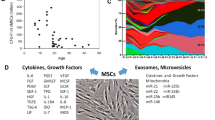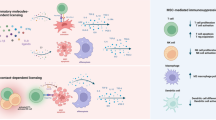Abstract
Mesenchymal stem cells (MSCs) represent a heterogeneous progenitor cell population derived from various sources, including bone marrow, placental and adipose tissues. These cell populations are being extensively investigated for their regenerative, immunomodulatory and tissue-protective properties, and the therapeutic potential of MSCs is officially being tested in patients suffering from ischaemic, inflammatory, autoimmune and degenerative disorders. Unofficially, hundreds of centres worldwide already offer MSCs as a 'miracle' panacea treatment for almost every known human disease. Data from in vitro and animal models suggest that MSCs administered either locally or systemically are able to home to stressed tissue and indeed deliver a protective effect via predominately paracrine factors. Furthermore, dozens of published uncontrolled clinical trials have demonstrated strikingly positive therapeutic effects of MSCs with little acute toxicity; however, no prospective controlled trials have yet confirmed these findings, with the exception of one randomized controlled trial in renal transplantation. Thus, large prospective controlled trials are urgently needed to better understand MSC-based therapies and define their potential utility in the treatment of rheumatic diseases. Herein, I provide my opinions regarding the progress of MSC therapies to date and highlight issues that need to be addressed in the future.
This is a preview of subscription content, access via your institution
Access options
Subscribe to this journal
Receive 12 print issues and online access
$209.00 per year
only $17.42 per issue
Buy this article
- Purchase on Springer Link
- Instant access to full article PDF
Prices may be subject to local taxes which are calculated during checkout


Similar content being viewed by others
References
Friedenstein, A. J. et al. Precursors for fibroblasts in different populations of hematopoietic cells as detected by the in vitro colony assay method. Exp. Hematol. 2, 83–92 (1974).
Tan, J. et al. Induction therapy with autologous mesenchymal stem cells in living-related kidney transplants: a randomized controlled trial. JAMA 307, 1169–1177 (2012).
Allison, M. Genzyme backs Osiris, despite Prochymal flop. Nat. Biotechnol. 27, 966–967 (2009).
Bianco, P. et al. The meaning, the sense and the significance: translating the science of mesenchymal stem cells into medicine. Nat. Med. 19, 35–42 (2013).
Caplan, A. I. Mesenchymal stem cells. J. Orthop. Res. 9, 641–650 (1991).
Sacchetti, B. et al. Self-renewing osteoprogenitors in bone marrow sinusoids can organize a hematopoietic microenvironment. Cell 131, 324–336 (2007).
Horwitz, E. et al. Clarification of the nomenclature for MSC: The International Society for Cellular Therapy position statement. Cytotherapy 7, 393–395 (2005).
Thomson, J. A. et al. Embryonic stem cell lines derived from human blastocysts. Science 282, 1145–1147 (1998).
Levenberg, S., Golub, J. S., Amit, M., Itskovitz-Eldor, J. & Langer, R. Endothelial cells derived from human embryonic stem cells. Proc. Natl Acad. Sci. USA 99, 4391–4396 (2002).
Takahashi, K. & Yamanaka, S. Induction of pluripotent stem cells from mouse embryonic and adult fibroblast cultures by defined factors. Cell 126, 663–676 (2006).
Frantz, S. Embryonic stem cell pioneer Geron exits field, cuts losses. Nat. Biotechnol. 30, 12–13 (2012).
Barde, Y. Caution urged in trial of stem cells to treat spinal-cord injury. Nature 458, 29 (2009).
Lazarus, H. M., Haynesworth, S. E., Gerson, S. L., Rosenthal, N. S. & Caplan, A. I. Ex vivo expansion and subsequent infusion of human bone marrow-derived stromal progenitor cells (mesenchymal progenitor cells): implications for therapeutic use. Bone Marrow Transplant. 16, 557–564 (1995).
Koç, O. N. et al. Rapid hematopoietic recovery after coinfusion of autologous-blood stem cells and culture-expanded marrow mesenchymal stem cells in advanced breast cancer patients receiving high-dose chemotherapy. J. Clin. Oncol. 18, 307–316 (2000).
Le Blanc, K., Tammik, L., Sundberg, B., Haynesworth, S. E. & Ringdén, O. Mesenchymal stem cells inhibit and stimulate mixed lymphocyte cultures and mitogenic responses independently of the major histocompatibility complex. Scand. J. Immunol. 57, 11–20 (2003).
Di Nicola, M. et al. Human bone marrow stromal cells suppress T-lymphocyte proliferation induced by cellular or nonspecific mitogenic stimuli. Blood 99, 3838–3843 (2002).
Bartholomew, A. et al. Mesenchymal stem cells suppress lymphocyte proliferation in vitro and prolong skin graft survival in vivo. Exp. Hematol. 30, 42–48 (2002).
Le Blanc, K. et al. Treatment of severe acute graft-versus-host disease with third party haploidentical mesenchymal stem cells. Lancet 363, 1439–1441 (2004).
Tyndall, A. & Uccelli, A. Multipotent mesenchymal stromal cells for autoimmune diseases: teaching new dogs old tricks. Bone Marrow Transplant. 43, 821–828 (2009).
Logan, G. J. et al. HeLa cells cocultured with peripheral blood lymphocytes acquire an immuno-inhibitory phenotype through up-regulation of indoleamine 2,3-dioxygenase activity. Immunology 105, 478–487 (2002).
Bocelli-Tyndall, C. et al. Human articular chondrocytes suppress in vitro proliferation of anti-CD3 activated peripheral blood mononuclear cells. J. Cell. Physiol. 209, 732–734 (2006).
Le Blanc, K. et al. Mesenchymal stem cells inhibit the expression of CD25 (interleukin-2 receptor) and CD38 on phytohaemagglutinin-activated lymphocytes. Scand. J. Immunol. 60, 307–315 (2004).
Traggiai, E. et al. Bone marrow-derived mesenchymal stem cells induce both polyclonal expansion and differentiation of B cells isolated from healthy donors and systemic lupus erythematosus patients. Stem Cells 26, 562–569 (2012).
Djouad, F. et al. Reversal of the immunosuppressive properties of mesenchymal stem cells by tumor necrosis factor alpha in collagen-induced arthritis. Arthritis Rheum. 52, 1595–1603 (2005).
Sajic. M. et al. Mesenchymal stem cells lack efficacy in the treatment of experimental autoimmune neuritis despite in vitro inhibition of T-cell proliferation. PLoS ONE 7, e30708 (2012).
Lee, R. H. et al. Intravenous hMSCs improve myocardial infarction in mice because cells embolized in lung are activated to secrete the anti-inflammatory protein TSG-6. Cell Stem Cell 5, 54–63 (2009).
Dwyer, R. M. et al. Monocyte chemotactic protein-1 secreted by primary breast tumors stimulates migration of mesenchymal stem cells. Clin. Cancer Res. 13, 5020–5027 (2007).
Gheisari, Y. et al. Genetic modification of mesenchymal stem cells to overexpress CXCR4 and CXCR7 does not improve the homing and therapeutic potentials of these cells in experimental acute kidney injury. Stem Cells Dev. 21, 2969–2980 (2012).
von Bahr, L. et al. Analysis of tissues following mesenchymal stromal cell therapy in humans indicates limited long-term engraftment and no ectopic tissue formation. Stem Cells 30, 1575–1578 (2012).
Bocelli-Tyndall, C. et al. Bone marrow mesenchymal stromal cells (BM-MSCs) from healthy donors and auto-immune disease patients reduce the proliferation of autologous- and allogeneic-stimulated lymphocytes in vitro. Rheumatology (Oxford) 46, 403–408 (2006).
Larghero, J. et al. Phenotypical and functional characteristics of in vitro expanded bone marrow mesenchymal stem cells from patients with systemic sclerosis. Ann. Rheum. Dis. 67, 443–449 (2008).
Wang, D. et al. Allogeneic mesenchymal stem cell transplantation in severe and refractory systemic lupus erythematosus: 4 years experience. Cell Transplant. http://dx.doi.org/10.3727/096368912X658719.
Filardo, G. et al. Mesenchymal stem cells for the treatment of cartilage lesions: from preclinical findings to clinical application in orthopaedics. Knee Surg. Sports Traumatol. Arthrosc. 21, 1717–1729 (2013).
Koh, Y. G. & Choi, Y. J. Infrapatellar fat pad-derived mesenchymal stem cell therapy for knee osteoarthritis. Knee 19, 902–907 (2012).
van der Kraan, P. M. Stem cell therapy in osteoarthritis: a step too far? BioDrugs 27, 175–180 (2013).
Thirabanjasak, D., Tantiwongse, K. & Thorner, P. S. Angiomyeloproliferative lesions following autologous stem cell therapy. J. Am. Soc. Nephrol. 21, 1218–1222 (2010).
Cronstein, B. How does methotrexate suppress inflammation? Clin. Exp. Rheumatol. 28, S21–S23 (2010).
Furusho, K. et al. High-dose intravenous gammaglobulin for Kawasaki disease. Lancet 2, 1055–1058 (1984).
[No authors listed] Smoke and mirrors. Nature 496, 269–270 (2013).
Cyranoski, D. Stem cells in Texas: cowboy culture. Nature 494, 166–168 (2013).
European Medicines Agency. Public Statement. Concerns over unregulated medicinal products containing stem cells [online], (2010).
Tarte, K. et al. Clinical-grade production of human mesenchymal stromal cells: occurrence of aneuploidy without transformation. Blood 115, 1549–1553 (2010).
European Medicines Agency. Committee for Advanced Therapies (CAT). Reflection paper on stem cell-based medicinal products [online], (2011).
Martin, I. et al. The survey on cellular and engineered tissue therapies in Europe in 2010. Tissue Eng. Part A 18, 2268–2279 (2012).
Nevskaya, T. et al. Autologous progenitor cell implantation as a novel therapeutic intervention for ischaemic digits in systemic sclerosis. Rheumatology (Oxford) 48, 61–64 (2009).
Keyszer, G. et al. Treatment of severe progressive systemic sclerosis with transplantation of mesenchymal stromal cells from allogeneic related donors: report of five cases. Arthritis Rheum. 63, 2540–2542 (2011).
Guiducci, S. et al. Autologous mesenchymal stem cells foster revascularization of ischemic limbs in systemic sclerosis: a case report. Ann. Intern. Med. 153, 650–654 (2010).
Carrion, F. et al. Autologous mesenchymal stem cell treatment increased T regulatory cells with no effect on disease activity in two systemic lupus erythematosus patients. Lupus 19, 317–322 (2010).
Liang, J. et al. Allogenic mesenchymal stem cells transplantation in refractory systemic lupus erythematosus: a pilot clinical study. Ann. Rheum. Dis. 69, 1423–1429 (2010).
Sun, L. et al. Umbilical cord mesenchymal stem cell transplantation in severe and refractory systemic lupus erythematosus. Arthritis Rheum. 62, 2467–2475 (2010).
Wang, D. et al. Efficacy of allogeneic mesenchymal stem cell transplantation in patients with drug-resistant polymyositis and dermatomyositis. Ann. Rheum. Dis. 70, 1285–1288 (2011).
Shi, D. et al. Allogeneic transplantation of umbilical cord-derived mesenchymal stem cells for diffuse alveolar hemorrhage in systemic lupus erythematosus. Clin. Rheumatol. 31, 841–846 (2012).
Li, X., Wang, D., Liang, J., Zhang, H. & Sun, L. Mesenchymal SCT ameliorates refractory cytopenia in patients with systemic lupus erythematosus. Bone Marrow Transplant. 48, 544–550 (2012).
Xu, J. et al. Allogeneic mesenchymal stem cell treatment alleviates experimental and clinical Sjögren syndrome. Blood 120, 3142–3151 (2012).
Liang, J. et al. Allogeneic mesenchymal stem cells transplantation in patients with refractory RA. Clin. Rheumatol. 31, 157–161 (2012).
Author information
Authors and Affiliations
Corresponding author
Ethics declarations
Competing interests
A. Tyndall has received consultancy fees from the following companies: Athesys, Celgene, Celerix, and Tigenix.
Rights and permissions
About this article
Cite this article
Tyndall, A. Mesenchymal stem cell treatments in rheumatology—a glass half full?. Nat Rev Rheumatol 10, 117–124 (2014). https://doi.org/10.1038/nrrheum.2013.166
Published:
Issue Date:
DOI: https://doi.org/10.1038/nrrheum.2013.166
This article is cited by
-
Dental pulp stem cell-derived exosomes revitalize salivary gland epithelial cell function in NOD mice via the GPER-mediated cAMP/PKA/CREB signaling pathway
Journal of Translational Medicine (2023)
-
Mesenchymal stem cells alleviate experimental autoimmune cholangitis through immunosuppression and cytoprotective function mediated by galectin-9
Stem Cell Research & Therapy (2018)
-
Characterization of embryonic stem cell-differentiated fibroblasts as mesenchymal stem cells with robust expansion capacity and attenuated innate immunity
Stem Cell Research & Therapy (2018)
-
The regulation of the Treg/Th17 balance by mesenchymal stem cells in human systemic lupus erythematosus
Cellular & Molecular Immunology (2017)
-
Adipose-Derived Mesenchymal Stem Cells in Autoimmune Disorders: State of the Art and Perspectives for Systemic Sclerosis
Clinical Reviews in Allergy & Immunology (2017)



